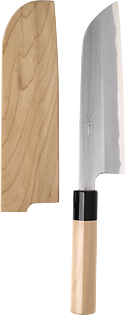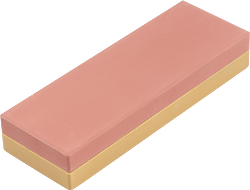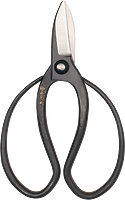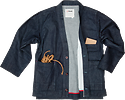Masashi Kobo Usuba
Japanese Vegetable Knife
More Information
Hand forged professional knife from Masashi, with single bevelled White Paper Shirogami steel hand laminated to a softer steel cladding. Usuba are used in Japan for traditional vegetable prep, and the single bevelled edge gives great control (with skill, needless to say) for the uber-thin katsuramuki technique. Compared to a Nakiri (which is more of a household knife) the Usuba cuts with more detail and control, but needs more skill. Masashi makes these in the kamagata style, popular in the Kansai area - the Kyoto chefs use the pointed end for fine detailed work.
Masashi trained under his uncle, Yoshida san, of Yoshikane, and now produces extraordinarily beautiful kinfes in his workshop in Sanjo, Niigata.
Tips
Single bevelled blades take a bit of getting used - like driving on the other side of the road!
More about Masashi
Masashi Yamamoto trained under his uncle, Yoshida san at Yoshikane, and produces knives of stunning quality - primarily in his signature SLD steel, a hard wearing, very-nearly-stainless-steel. In 2018 Masashi moved his forge to a new factory in Sanjo (in Niigata Prefecture) and now has two apprentices working with him.
We think he looks a little like Christopher Walken, and he claims to be a children’s ski instructor - something we don’t doubt.
Delivering to US (Paying in USD)
Please note: By law, we are not permitted to sell a knife or blade to any person under the age of 18. By placing an order for one of these items you are declaring that you are 18 years of age or over. These items must be used responsibly and appropriately.
Masashi Kobo Usuba
- 200g
- Shirogami #2 White Paper Steel
- 63 HRC
- Magnolia handles
- Made in Japan
- In Stock - Available to dispatch worldwide, contact us for showroom stock availability
Delivery
UK: (excluding Tripod Ladders)
- Free delivery for orders over £100*
- £4.00: Standard service via Royal Mail Tracked 48; typically 2–5 working days.
- £7.50: Priority service via Royal Mail Tracked 24, DHL, FedEx, or UPS; typically delivered next working day by 6pm (excluding Sat/Sun and UK Bank Holidays) for orders received before 12pm GMT Mon–Fri (excluding UK Bank Holidays).
Global: (excluding Tripod Ladders)
- Free delivery for orders over £/$/€100*
- Price depends on location - adjust the COUNTRY tab in your basket to see the price.
- We use DHL, FedEx, or UPS, and we’ll email you the tracking info.
*Customs fees may apply and are estimated during checkout. Surcharges may apply to some larger or heavier items to some areas.
* Please note Niwaki are not responsible for any import duty, taxes or fees incurred and these will be will be collected by our courier during customs clearance — For EU countries, when possible DHL will provide an estimate on the order confirmation page.
Knife Care
For better or worse, Western knives are often seen as general purpose kitchen tools, used for cutting, prising, levering and all sorts of other jobs around the kitchen (and sometimes beyond).
Japanese knives should not be viewed this way and it may require a change of mindset to get the best out of your knife and ensure it delivers many years of service.
Cared for correctly, this ought to be the case: the quality of the craftsmanship and the ease with which they can be kept incredibly sharp are two of the main reasons to make the switch to Japanese steel, but that comes at a price: the steel –especially steel with high carbon content - may be more brittle than you are used to and they are not for the heavy-handed or the careless. They are unforgiving tools and you may not get an opportunity to make the same mistake twice.
A good rule of thumb is to show them the same respect you show your poshest wine glasses, but here are some other pointers.
Commons mistakes to avoid:
- Leaving wooden handled knives to soak in water.
- Washing knives in the dishwasher.
- Not storing them carefully: store them individually, not jumbled up with other cutlery.
- Cutting into bone. If you’re not sure whether there’s bone, or you know there to be bone present, go very slowly and carefully, or consider using a different knife.
- Trying to cut frozen foods.
- Cutting down too hard on to the wrong sort of surface, for example kitchen worktops.
Don’t be put off. They are great to use and easy to care for. To get the best from your knives:
- Wash them by hand and dry thoroughly afterwards.
- Wipe over with Camellia Oil if not using regularly.
- Sharpen every two weeks or so of regular use.
- Use the Niwaki Combination Stone for everyday sharpening.
- Take care with harder foods, such as the skin of a pumpkin or a squash.
Essentials
Niwaki Daikiba Secateurs
$64.00 exVAT
Sentei Garden Scissors
$34.50 exVAT
Niwaki Mainichi Knife
From $31.50 exVAT
Niwaki GR Pro Secateurs
From $85.50 exVAT
Niwaki Hori Hori
$34.50 exVAT
Niwaki Forged Snips
$34.50 exVAT
Niwaki Kojima Work Jacket
$313.00 exVAT
Niwaki Tripod Ladder
From $289.00 exVAT
Niwaki Garden Shears
From $85.50 exVAT
Niwaki GR 210 Folding Saw
$42.50 exVAT





















